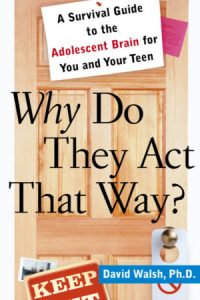Book Group Guide
Introduction
Even smart kids do stupid things. It’s a simple fact of life. No one makes it through the teenage years unscathed—not the teens and not their parents. But now there’s expert help for both generations in this groundbreaking new guide for surviving the drama of adolescence.
In WHY DO THEY ACT THAT WAY? nationally renowned, award-winning psychologist Dr. David Walsh explains exactly what happens to the human brain on the path from childhood into adolescence and adulthood. Revealing the latest scientific findings in easy-to-understand terms, Dr. Walsh shows why moodiness, quickness to anger and to take risks, miscommunication, fatigue, territoriality, and other familiar teenage behavior problems are so common—all are linked to physical changes and growth in the adolescent brain.
But WHY DO THEY ACT THAT WAY goes way beyond the well-known issues of hormones and peer pressure. It’s the first book to explain the changes in teens’ brains and show parents how to use this information to understand, communicate with, and stay connected to their kids. Dr. Walsh actually likes teenagers and has worked with them and their families for more than thirty years as a parent, teacher, psychologist, coach, and trusted expert. He makes sense of their many mystifying, annoying, and even outright dangerous behavioral difficulties and provides realistic solutions for dealing with everyday as well as severe challenges. Dr. Walsh’s techniques include, among others: sample dialogs that help teens and parents talk civilly and constructively with each other, behavioral contracts, and “Parental Survival Kits” that provide practical advice for dealing with issues like curfews, disrespectful language and actions, and bullying. In addition, Dr. Walsh explores the short- and long-term effects of drug and alcohol use on adolescent brain development, the effects of computer games and other activities, the brain differences between the sexes, and how to talk to your teen about sex and the epidemic of sexually transmitted diseases.
Through real-life stories, WHY DO THEY ACT THAT WAY? offers an enjoyable new perspective on teen problems and an arsenal of strategies for helping adolescents and adults through them. Armed with a new understanding of the teenage brain and a new set of effective responses to small and serious, emerging and entrenched problems, parents can help their kids learn to control impulses, manage erratic behavior, avoid drug and alcohol use, cope with their changing bodies, focus their minds, and, in effect, develop a second brain. Dr. Walsh’s proven tactics for averting conflicts, keeping teens healthy and safe, educating and guiding them, and solving many other parenting challenges will be extremely welcome to frustrated parents trying to help their children through this confusing time of life.
Discussion Questions
1. How does learning about the physical changes in the teen brain help us understand their behavior? Are there scenarios from relationships you have teens that demonstrate these processes?
2. How does understanding the changes in the teen brain help us develop parenting strategies to help our teen navigate adolescent neural fireworks?
3. How do we strike the balance between being understanding of the “normal” erratic behavior patterns of teens and setting firm boundaries and limits on innapropriate behavior? What about this striking this balance is the most difficult?
4. How do we identify red flags in the behavior of the teens in our lives amidst the wildly vacillating moods of “normal” teenagers? What resources do you have in your community to address serious behavior problems?
5. How do you relate to teenagers differently than children? What changes? What do you want to see change?
6. Do you notice different behavior in the boys and girls in your life? How does the research on the differences between boy brains and girl brains enable you to work better with teens? How do you wrestle with the difference between the biological and the social when working with teenagers? When can these differences represent limits instead of possibility for your teen? How can you use this research to benefit your teen?
7. Where are your teens getting messages about sex, sexuality and drugs? What are the messages they recieve? Do you talk to your kids about these topics? In a culture where teens spend more time with media than adults, how to we connect with our kids on these sensitive issues? What role do your schools play in educating teens about these issues?
8. Do you think that it would be helpful for teens if they understood the changes happening in their own brains? How would this influence their understanding of the risk they take when they use drugs and alcohol?
9. What is the difference between connection and control? Give examples from your life.
10. What is it you love most about working with teenagers? What is the most frustrating? Have you found ways to remind yourself of the answers to number one? Which do you show more to teens and what message does that send them?
About the Author
David Walsh, Ph.D. is the president and founder of the National Institute on Media and the Family. Psychologist, educator, author, speaker and parent of three, Dr. Walsh has emerged as one of the world’s leading authorities on parenting, family life and the impact of media on children and teens. He is a consultant to the World Health Organization and author of eight books including the national best seller Why Do They Act That Way? A Survival Guide to the Adolescent Brain for You and Your Teen. In his latest book, No. Why Kids-of All Ages-Need It and Ways Parents Can Say It, Dr. Dave describes the epidemic of “Discipline Deficit Disorder” and what we can do to help our kids be happy and successfu. Dr. Walsh has been the recipient of numerous awards and is a regular guest on national radio and television.

